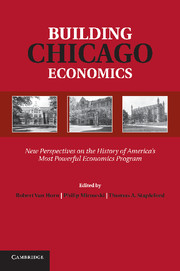 Building Chicago Economics
Building Chicago Economics from Part Three - Imperial Chicago
Published online by Cambridge University Press: 05 November 2011
What a book a Devil’s Chaplain might write on the clumsy, wasteful, blunderingly low & horridly cruel works of nature!
– Charles Darwin Quoted in (Desmond and Moore , 449)These days, you would probably have to search far and wide to find an economist who scorns the siren song of an “evolutionary economics.” Many seem to think that the immanent prospect of a concertedly “Darwinian” bioeconomics is laden with promise, thoroughly exhilarating, and a glorious liberation from the more buttoned-down methodology of science that had dominated the previous generation of economic orthodoxy, itself sometimes characterized by the disparaging term “physics envy.” More often than not, they also seem to approach evolution as a phenomenon that is intrinsically upbeat and edifying, forgetting that Darwin himself struggled with a rather darker view of Nature and man’s place within it (as in our epigraph). Sometimes the terminology of evolution designates nothing more precise than nonspecific pervasive change versus the supposed stasis of neoclassical theory: “Always history is being made; opinions, attitudes and institutions change, and there is evolution in the nature of capitalism” (Knight, , 184). Furthermore, economists have had recourse to the most amazingly diverse range of supposed progenitors of their evolutionary brand of economics, from Alfred Marshall to Thorstein Veblen to Joseph Schumpeter to Carl Menger to Herbert Spencer to Kenneth Boulding to Albert Schäffle to Sidney Winter to John Nash, and so on. The mere fact that no two of these candidates would have deigned to wholeheartedly endorse each other’s version of economics, much less provide any single coherent intellectual framework that might encompass the other, reveals the extent to which “evolutionary economics” has been a leaky portmanteau bucket, temporarily confining whatever the individual theorist wished to put in it, at least until anything potent drained away of its own accord.
Of course, not everyone has coquetted with evolution in economics in so blasé or cavalier a fashion. A special dispensation must be issued to Geoffrey Hodgson, who, from his Economics and Evolution () onward, has thrashed against the prevailing current to nail down precisely what many historical thinkers actually meant when they ventured to implement their evocative summons of biology into economics, hoping to bend Nature to their own purposes. Of late, Hodgson has been concerned, however, to sift out what he deems to be illegitimate appeals to biology from the version of evolution he himself favors, which he has called “Universal Darwinism” (2002; Hodgson and Knudsen, ; Nelson, ). Adopting a stance nominally opposed to those who deal in metaphors and analogies, he currently advocates instead a regulatory ontological principle of natural selection that he claims transcends academic disciplines, physical organisms, or empirical detail. For someone unusually sensitive to the diverse variant referents of the evolution concept throughout the history of biology, his current quest to hold all economic discourse up to a single timeless evolutionary benchmark runs the risk of obscuring the multifarious uses of bioeconomics language by economists; it may end up providing unintended cover for those earlier economists whom he formerly indicted as innocent of any deep understanding of biology. Fervent invocations of a unified Theory of Everything risks peremptorily banishing “The Social,” along with blurring the alternative meanings of “The Natural” in economics and social theory in general. Not everyone regards the theory of evolution, as it is currently understood, as the ideal vehicle to deliver economics from the happy valley of conceptual complacency, or even the postcrisis discombobulation it now occupies.
To save this book to your Kindle, first ensure [email protected] is added to your Approved Personal Document E-mail List under your Personal Document Settings on the Manage Your Content and Devices page of your Amazon account. Then enter the ‘name’ part of your Kindle email address below. Find out more about saving to your Kindle.
Note you can select to save to either the @free.kindle.com or @kindle.com variations. ‘@free.kindle.com’ emails are free but can only be saved to your device when it is connected to wi-fi. ‘@kindle.com’ emails can be delivered even when you are not connected to wi-fi, but note that service fees apply.
Find out more about the Kindle Personal Document Service.
To save content items to your account, please confirm that you agree to abide by our usage policies. If this is the first time you use this feature, you will be asked to authorise Cambridge Core to connect with your account. Find out more about saving content to Dropbox.
To save content items to your account, please confirm that you agree to abide by our usage policies. If this is the first time you use this feature, you will be asked to authorise Cambridge Core to connect with your account. Find out more about saving content to Google Drive.